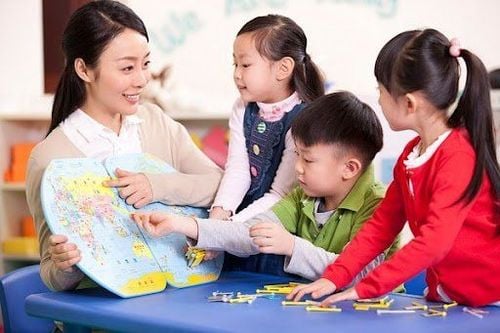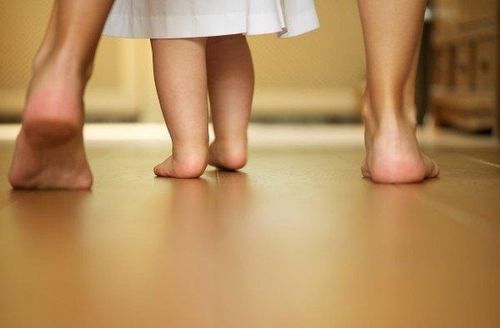This is an automatically translated article.
Post by MSc Tran Ngoc Ly - Psychologist - Unit of Regenerative Medicine Clinic and Educational Psychology - Vinmec Times City International General Hospital
The period before the age of 6 is the first years of life, and is a time that needs attention for children to be taken care of physically and to form personality. What do children really need at this age? Does every day, children say "I like to watch TV", "I want to buy dolls like Hoa", "I don't like Mr. Khanh"... are they in need of these things? What do children really need?
1. General understanding Through several theories of needs in Western psychology, psychologists have shown that the "need" factor is closely related to children's behavior and personality. People. For example, according to behavioral psychology, a number of studies by scientists such as Wkoler, Ethordike, NE.Mil have shown that behavior is motivated by need and concluded that "needs can be behavioral decisions”, especially specific or physiological needs. Although these experiments have only been performed on animals, the conclusions made are also partly reasonable when analyzing human behavior, especially later, behaviorists have added an intermediary factor. such as life experience, waiting time, consideration... in how stimuli affect behavior.
According to Clack Hull, a representative of existential psychology, it is said that physiological needs govern human life. And according to Erich Formm - according to the new school of psychoanalysis, it is also said that "needs create human nature". The needs can be mentioned include: the need for person-to-person relationship; the need to exist "mind" of the human being; the need to identify oneself and society with ethnicity, class and religion; the need for sustainability and harmony; cognitive/research needs.
Maslow - a representative of humanistic psychology also offers a hierarchy of needs, which lists a number of basic human needs, arranged from the bottom of the pyramid as essential needs (needs lacking in human needs). shortfall) to the top of the pyramid is the less essential need (development need). These needs are hierarchical, but still have flexibility and change to specific conditions. Henry Mussay also mentioned the need "to be a mobile organization that guides and promotes behaviour". According to Phillip Kotler, he studies needs in business that can be divided into types such as: stated needs, actual needs, unspoken needs, pleasure needs, hidden needs...
Some researchers of Soviet psychology also asserted: needs are the first important internal factors that motivate human activity. As Unetze argues that each behavior is a need, it is possible to classify their needs based on their behavior. Lomov also believes that needs are an attribute of personality, each person has many types of needs: such as personal needs, social needs, cognitive needs, creative needs...

2. Children's needs As can be seen, needs influence behavior, and children's behaviors clearly articulate their desires. As for children, especially children under 3 years old, what needs do they have and how do they express them without language? Some of the needs can be referred to below:
Needs about the child himself: are the needs for the development of the child such as the need to eat, drink according to the dose and preferences of the child, to be free. choose what you need with yourself without being forced; need time to sleep - exercise for age, not necessarily sitting still; guaranteed physical and mental safety.
Children can show by liking one food and not liking another, or by preferring to sleep in a dark environment or needing music. This can be clearly seen when babies are only a few months old, more clearly at the time of solids, babies will prefer some flavors to others. Or children from the time they start crawling and walking (about 9 months) will be active by climbing, running, touching, biting... objects to explore continuously. These activities can last until the child is 2 years old. Parents need to pay attention to this need in the development of children in the first years of life to create conditions for children to experience.
Need for love: children need to be told or shown love by their parents, for emotional support, for loved ones to spend time to talk, to be cuddled by their family when they fail, This need can be seen in children's behaviors such as clinging to their parents, always whining, demanding their parents, liking to be held, going to strange places can be dangerous. fear and cry... This need in children is completely normal. However, many children will show inappropriate behaviors such as clinging to their parents, or crying loudly when they go to a new school, affecting the children's learning and playing functions... Parents need to understand and empathize, thereby finding appropriate ways to reassure children.
The need for order: what happens to children, especially children under 3 years old, needs to be in a certain order. Orderliness is demonstrated by adults arranging the environment, or creating daily routines for children and following it. For example, there should be rules about the arrangement of the study area, books on the table, paints and pens in the basket, the pen box on the shelf... always in a fixed position for children to remember. and follow. If every day, if you put things in a different place, children will not know where to store or find them, forming an indiscriminate character for children.
The age of sensitivity to order begins at about 18 months, when children have a certain level of awareness. Children will be able to distinguish one person's utensils from another's, distinguish the location of water cups and water bottles, distinguish the way home and the way to school.... By age 3, calculate order When it comes to self-perpetuating suicide in children, there may be times when the child will be "stiff" and just follow the habits they've done before – but that needs to be respected, met, and changed.

Needs for personal development: Children need to be involved in activities in life, develop 5 senses, learn subjects such as music, art, movement... so that they are ready to participate Joining the new society is the classroom environment. Children also need to participate in stories, to contribute ideas on issues related to themselves, for example: to choose clothes, to choose school supplies, to decide to play first. will drink milk first...
Self-affirmation needs: related to the formation and development of will, for example, children can say "no" when they don't like it, and need to take responsibility if they do. wrong, like needing to clean up if kids break things. Children like and choose what activities are at their needs, adults can guide but cannot force children to do this or that. Parents should share daily stories with their children, so that children can be heard and understood, and can think and express their opinions.
Needs for dedication and recognition: When children are able to work, there will be a need and responsibility to do everything, be it small things to help parents in the family such as cleaning the house, storing clothes... or help teachers and friends around: take care of babies, walk them across the street, arrange tables and chairs in the classroom... When assigned to work, children will feel confident and have Feeling recognized, from which the body will produce dopamine hormone - a hormone of happiness - making the child happier and more excited. Parents should let children start with things in the family first so that children can be guided, and can control, and from easy things first, difficult things later, and need to eliminate dangerous things for children. After that, children need to be praised by adults and recognized for their work, results and efforts. By doing so, parents will help their children improve their self-esteem. This need shows that the child needs to be recognized as a member of the family and acknowledge the child's efforts
Need to be understood: the child needs adults to listen to his stories, his feelings, his Children's feelings are not always imposed according to the way of thinking and feeling of adults. This is especially important when a child cries because he or she is teased or beaten, or when he feels lonely.
Knowing that children have such needs, how should parents behave to meet the needs of the child, and to help the child develop better? Parents can refer to some of the things below with their children:
When talking with children, you should sit down, so that the adult's eyes are at the child's eye level - the level of communication with each other - shows respect for children Share with children about everyday things, with parents and ask about things they encounter – this has the effect of enhancing language comprehension, attention, and waiting ability for children , provides vocabulary and allows children to meet their self-affirmation needs. When parents want their children to do something, give them the choice "Do you like to ride the bike first or rollerblade first?". Allowing children to decide for themselves what they like will give them confidence and freedom, but still within the limits of what parents can observe. When children make mistakes, let them take responsibility for their mistakes. The "responsibility" is not to be scolded, spanked, or advertised everywhere, but rather to solve the children's problems within their ability. For example, if a child pours water and spills it, he or she will need to go get a towel and wipe the wet area; if your child breaks your things, he or she needs to apologize and compensate for the damage (within the child's ability) Always ask your child's opinion before things in life, about feelings, about his judgment or feelings, or about children's choices.
Please dial HOTLINE for more information or register for an appointment HERE. Download MyVinmec app to make appointments faster and to manage your bookings easily.














